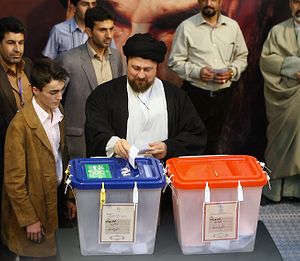In Iran, the supreme leader–currently Ayatollah Ali Khamenei–represents the apex of power in the Islamic Republic’s theocratic state. Khamenei is old, ill, and is not expected to remain at the top for much longer. Thus, the selection of his successor will be critical for the country’s future direction. Indeed, after the conclusion of the Joint Comprehensive Plan of Action (JCPOA) last July, Iran’s path toward relative economic normalization with the west means the issue of Khamenei’s succession should be of all the more interest to outside observers.
On February 26, Iranians will select a new cohort of Islamic scholars for the 88-member Assembly of Experts. (Iranians will also vote in a new cohort of Parliamentarians; 2016 is the first time that parliamentary elections will take place concurrently with the Assembly of Experts election.) The Assembly, under the Islamic Republic’s constitution, is charged with overseeing the Supreme Leader’s performance and, in the case of the leader’s death, is charged with selecting a replacement.
Interestingly, a familiar name has emerged in the lead up to next month’s elections. Seyyed Hassan Khomeini, grandson of the founder of the Islamic Republic, Ayatollah Ruhollah Khomeini, is running for the Assembly. Khomeini, 43, is broadly popular in Iran, but has recently faced opposition from extreme conservatives.
Khomeini, in a bid to avoid controversy over his somewhat sudden and unexpected bid for the Assembly, decided to run for the Assembly as an “independent” candidate. Khomeini’s popularity among Iranian politicians with reformist tendencies has drawn criticism that his name and “brand” are a vessel for these groups to seize disproportionate clout within the Assembly and over the future of Iran’s government more broadly.
As Rohollah Faghihi writes over at al Monitor, Iranian hard-liners see a range of reasons that Khomeini, despite his famous last name, should be disqualified from participating in next month’s election. Faghihi notes that hard-liners see Khomeini as “part of an alleged plot by the Expediency Council chairman, Ayatollah Ali Akbar Hashemi Rafsanjani, to seize control over the influential assembly.”
Complicating matters further for Khomeini, in early January, he missed an exam that is required for candidates planning on running for the Assembly. The Iranian Guardian Council–a powerful political organ in the Islamic Republic that acts as a supreme court and election monitoring body in one–responded by saying that all candidates had been sent a text message about the timing of the exam and that Khomeini would receive no special treatment. The Guardian Council has been known to inhibit reformists from gaining undue influence over the country’s political institutions.
Keep an eye on Iran’s elections next month. It’s worth cautioning that whatever the outcome of the parliamentary and Assembly of Experts elections, we shouldn’t expect anything close to a decisive reformist shift. Khamenei’s inevitable passing will be the more dramatic event as far as Iran’s domestic direction is concerned. But with the JCPOA nearing implementation within days and Iran’s intensifying sectarian struggle with Saudi Arabia, next month’s elections will nonetheless be worth watching.

































